Obama urges Russia to move its troops away from Ukrainian border
March 28, 2014 -- Updated 1532 GMT (2332 HKT)
STORY HIGHLIGHTS
- "It may be that they've got additional plans," U.S. President says of Russian leaders
- Russian President Vladimir Putin "may be entirely misreading the West," he says
- U.S. officials say Russia may have as many as 40,000 troops near its border with Ukraine
- Russia annexed Ukraine's Crimea region after a hastily called referendum
(CNN) -- Russia could ease tensions with Ukraine if it were to move its troops away from its border with Ukraine and begin direct talks with the Kiev government, U.S. President Barack Obama said in an interview aired Friday by CBS News.
"You've seen a range of troops massing along that border under the guise of military exercises, but these are not what Russia would normally be doing," the President said. "It may simply be an effort to intimidate Ukraine, or it may be that they've got additional plans.
"And, in either case, what we need right now to resolve and de-escalate the situation would be for Russia to move back those troops and to begin negotiations directly with the Ukrainian government as well as the international community."
Russia may have 40,000 troops near its border with Ukraine, two U.S. officials told CNN on Thursday. The officials said that this estimate was largely based on satellite imagery and that a firm number is difficult to assess.
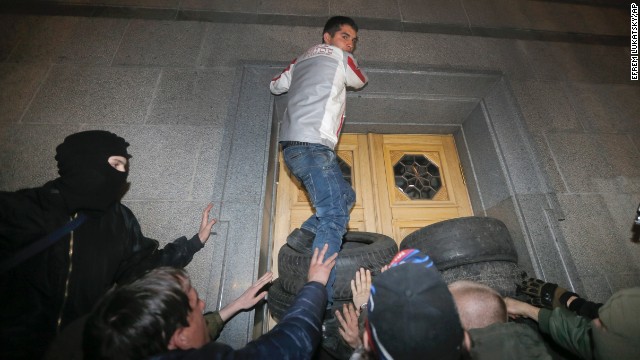
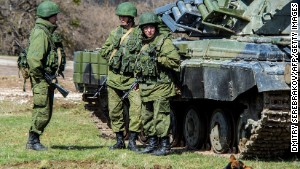
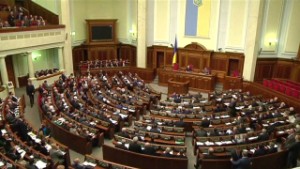
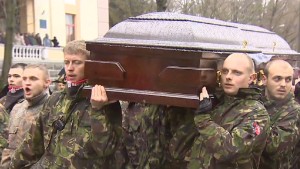
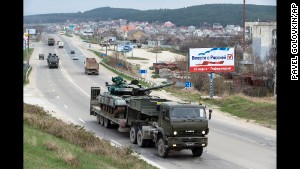
However, a spokesman for Ukraine's Council of National Security and Defense, Yarema Dukh, told CNN his government estimates 88,000 Russian troops are at the Ukrainian border.
U.S. officials said they believe the higher estimates may reflect Russian troops on alert farther to the east.
Russia has said its troops are carrying out snap military exercises in the region.
Obama said he believes Russian President Vladimir Putin still harbors a grievance over the 1991 dissolution of the Soviet Union. "You would have thought that, after a couple of decades, there'd be an awareness on the part of any Russian leader that the path forward is not to revert back to the kinds of practices that were so prevalent during the Cold War."
Instead, he said, Putin should be moving toward further integration with the world economy.
Obama said that Putin has described the breakup of the Soviet Union as tragic, and that he may feel that the West has taken advantage of Russia.
"He may be entirely misreading the West," Obama said. "He's certainly misreading American foreign policy. We have no interest in encircling Russia, and we have no interest in Ukraine -- beyond letting the Ukrainian people make their own decisions about their own lives."
He rejected the notion that Russia's concerns over maintaining its influence along its borders might justify its invasion of other countries.
"Certainly, they're going to have influence -- because of trade and tradition and language and heritage -- with Ukraine," he said. "But there's a difference between that and sending in troops and, because you're bigger and stronger, taking a piece of the country. That is not how international law and international norms are observed in the 21st century."
Russia rejects U.N. resolution
Obama's comments were broadcast as Russia dismissed a U.N. General Assembly resolution that branded Crimea's secession referendum invalid, calling it "counterproductive."
The Russian Foreign Ministry said the U.N. vote -- which followed Moscow's annexation of Ukraine's Crimea region last week on the basis of the hastily called referendum -- would do nothing to help resolve the situation.
"The counterproductive initiative with the General Assembly's resolution only complicates efforts to stabilize the internal political crisis in Ukraine," the ministry said in a statement.
The U.N. vote, held Thursday, saw 100 countries back the nonbinding resolution, with 11 opposed and 58 abstaining.
Russia's actions in Ukraine have been widely condemned by the West and prompted concern in Kiev and other former Soviet states that further incursions may follow.
On Friday, Russian Foreign Minister Sergey Lavrov told reporters in Moscow, "I hope that the situation will be accepted with a sense of reality by our European neighbors."
Also in Moscow, Russian Defense Minister Sergei Shoigu said that Ukrainian troops in Crimea who had chosen to remain in the Ukrainian Armed Forces had withdrawn. "The change in state symbols on all ships and in all divisions that have sided with the Russian army has been completed," he said.
A spokesman for the Ukrainian Defense Ministry in Crimea, Vladislav Seleznev, said military personnel and their families from a number of military bases were expected to depart Saturday for inland Ukraine.
Putin said that events had demonstrated that Russian forces were prepared. "The recent events in Crimea were a serious test," the Russian President said at a ceremony marking military promotions, according to the Russian news agency Interfax. "They demonstrated both the completely new capabilities of our Armed Forces and the high morale of the personnel."
On Friday, Ukraine's ousted President Viktor Yanukovych stepped into the fray with a call for Ukrainians to demand a referendum on the future status of each region in the country, according to Russian state news agency ITAR-Tass.
"As the President whose thoughts and heart are together with you, I call on each reasonable citizen of Ukraine -- don't let the imposters use you! Demand a referendum on the determination of the status of each region within Ukraine," Yanukovych said in an address to the Ukrainian people.
He said that a referendum for all the regions was the only way to stabilize the country, and that early presidential elections planned for May will be neither fair nor constitutional.
Yanukovych also said he wished to be removed from his post as chairman of the Party of the Regions.
Yanukovych resurfaced in Russia days after leaving Ukraine amid bloody street protests in February against his decision to turn away from a European Union trade deal in favor of closer ties with Moscow.
He and Russia say he is still the legitimate leader of Ukraine, but the West disagrees. The interim government in Kiev was voted in by a large majority in parliament, including members of Yanukovych's own party.
Russia seized control of Crimea amid the political upheaval that followed Yanukovych's ouster -- a step cemented by the controversial referendum and a new treaty that absorbed the Black Sea peninsula into the Russian Federation.
Now, observers in the West fear Moscow may make incursions into eastern Ukraine, where there are strong ties to Russia, despite the threat of deeper EU and U.S. sanctions.
International bailout
In another development Thursday, former Ukrainian Prime Minister Yulia Tymoshenko, who was released from prison last month, said she intends to run for president in elections on May 25.
After more than two years in prison, she was released in February after the ouster of her archrival, Yanukovych.
Tymoshenko said she intended to ask delegates at her Batkivshchyna Party congress on Saturday to nominate her as a presidential candidate.
Ukraine's elections are taking place against a backdrop of poor economic conditions, Moscow's annexation of Crimea and rumblings of discontent in the mainly Russian-speaking eastern regions.
Tymoshenko's announcement came as the International Monetary Fund announced a $14 billion to $18 billion bailout for Ukraine to avoid bankruptcy. The bailout is tied to painful reforms as the country faces an escalating standoff with Russia.
Ukraine Foreign Minister Oleksandr Shlapak said he was expecting the first transfer to be in the amount of $3 billion, though he did not say when.
Obama on Thursday praised the loan agreement between the IMF and Ukraine, and said the United States will do its part to help.
The U.S. Senate on Thursday approved $1 billion in loan guarantees for Ukraine, along with sanctions against Russia for its intervention in Ukraine.
Earlier this month, the House of Representatives approved Ukraine loan guarantees and is now voting on sanctions.
A large majority of Crimeans voted in favor of leaving Ukraine for Russia in the referendum held 12 days ago. It was dismissed by the interim government in Kiev and the West as illegitimate.
The Black Sea peninsula, which has a majority ethnic Russian population, was part of Russia until 1954 and has long historical and cultural ties to the country.
CNN's Marie-Louise Gumuchian, Radina Gigova, Brian Walker, Alexander Felton and Victoria Butenko contributed to this report.
We recommend
From around the web
Hypersonic missile boosts Chinese confidence(Nikkei Asian Review)
From cheap to chic: The best noodles in Jakarta(Marie France Asia)
March 27, 2014 -- Updated 1141 GMT (1941 HKT)
Just when you thought this divorce couldn't get any messier...
March 27, 2014 -- Updated 1158 GMT (1958 HKT)
U.S. President Barack Obama called for Russia to de-escalate the situation in Ukraine and warned of further isolation and "costs" if Moscow doesn't respond.
March 26, 2014 -- Updated 1617 GMT (0017 HKT)
Frida Ghitis says President Obama has an opportunity to make the most of the situation in Ukraine.
March 25, 2014 -- Updated 1724 GMT (0124 HKT)
Across Ukraine's eastern border, Russian troops continue massing. Kiev fears it may be an invasion force ready to push into Ukraine.
March 24, 2014 -- Updated 0517 GMT (1317 HKT)
As troops continues to build-up along Ukraine's border, fears are growing that Russia may be eying more territory.
March 20, 2014 -- Updated 1003 GMT (1803 HKT)
Putin sees Russia -- long the world's largest country -- as a victim of both the West and Communists, writes Alexander Motyl.
March 24, 2014 -- Updated 1337 GMT (2137 HKT)
The United States and Europe have reacted against Russia's military intervention in Crimea last week with different threats -- here's why:
March 20, 2014 -- Updated 1105 GMT (1905 HKT)
Is the rest of Ukraine safe? Is Ukraine under threat? We carefully examine both sides of the debate in the Crimean crisis:
March 19, 2014 -- Updated 1107 GMT (1907 HKT)
"The answer depends on what your perspective is," said David Rothkopf, editor of Foreign Policy magazine.
March 19, 2014 -- Updated 1156 GMT (1956 HKT)
The situation in Ukraine remains tense after Crimea's annexation, and citizens find it difficult trying to anticipate what comes next.
March 18, 2014 -- Updated 1036 GMT (1836 HKT)
West needs to frighten Putin, to prevent him moving in to other regions, writes Simon Tisdall.
March 18, 2014 -- Updated 1403 GMT (2203 HKT)
A former Kremlin adviser says Putin has gone too far to pull back -- regardless of sanctions.
March 18, 2014 -- Updated 1444 GMT (2244 HKT)
CNN's Ivan Watson reports on the Ukrainian reaction to the Russian treaty with Crimea and plans to annex the region.
March 26, 2014 -- Updated 1615 GMT (0015 HKT)
Images from Crimea, Donetsk, Kiev and elsewhere as the future of Ukraine lies in doubt.
Visually compare Ukraine and Russia's military forces in our infographic:
March 21, 2014 -- Updated 0121 GMT (0921 HKT)
Scenes from Ukraine and Crimea, captured by CNN teams
The current crisis is largely fueled by Ukraine's mixed loyalties and linguistic divisions. See where the country is split.
Have you witnessed the protests in Ukraine? Send us your images and video, but please stay safe.
Most Popular
Today's five most popular stories
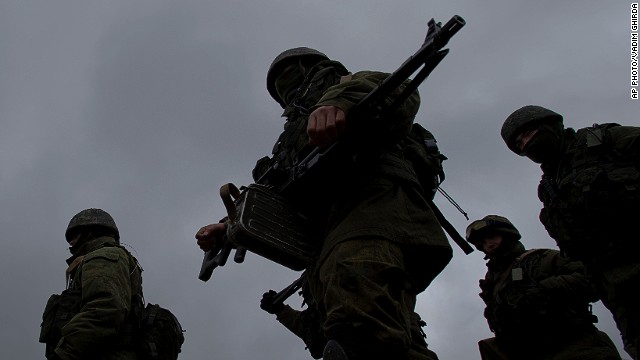




































No comments:
Post a Comment